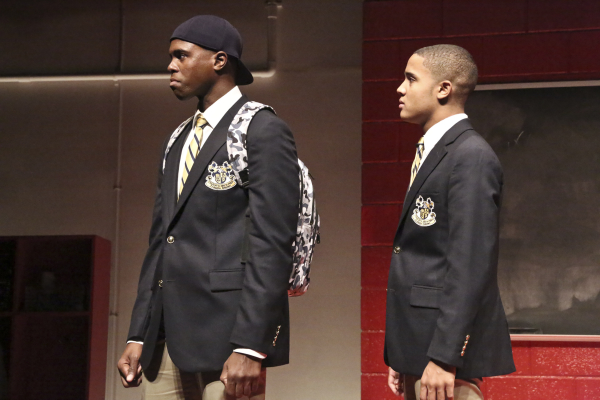Choir Boy

(© Michael Lamont)
A few scenes into Tarell Alvin McCraney’s play Choir Boy, we find an eminent teacher — who happens to be white — returning to an elite African-American prep school where he has taught previously. His one proviso: that he be allowed to challenge his students’ systems of beliefs, and make them approach different facets of their lives from an "out of the box" perspective. Not only does the headmaster agree, when student unrest causes dissention among the singers, the headmaster makes Mr. Pendleton the sponsor of the school choir.
The Drew School for Boys is steeped in traditions that many of its students embrace and cling to like barnacles to a hull. But these students must also learn the art of adaptation. Particularly amid the members of the choir whose appointed student leader, Pharus Young, is gay.
With Choir Boy — having its L.A. premiere at the Geffen Playhouse — the seriously gifted McCraney is not offering the umpteenth incarnation of Miss Brody, Mr. Chips or any other name-your-pot-stirring-educator. Mr. Pendleton (Leonard Kelly-Young) may get in his students’ faces, but at the Drew School, it’s the kids who make the noise. And what a magnificent noise it is. Superbly acted and peppered with spirituals that have been stirringly arranged by music director Jason Michael Webb, the production fills the stage with joyous music and plenty of food for thought.
In the first scene, when Pharus (a golden-throated Jeremy Pope) sings the school song at the Drew Commencement, we hear the strength and confidence of a young man who has been given a very serious gift. Then we hear that gift spat upon; the song is interrupted by offstage snickering and taunts: "Sissy!" Pharus is thrown off his rhythm, and he is subsequently called in to see the headmaster (played by Michael A. Shepperd). Citing the school honor code, Pharus refuses to rat out his heckler. But as the designated student choir leader for the upcoming year, he does have some power, which he is not afraid to use.
Pharus promptly boots the heckler, Bobby Marrow (Donovan Mitchell), from the choir for disruption even though Bobby is the headmaster’s nephew. Bobby’s lackey Junior (Nicholas L. Ashe) is allowed to remain in the choir, and he harmonizes expertly – and peacefully – with Pharus, his roommate and fellow choir member A.J. (Granthan Coleman) and David Heard (Caleb Eberhardt), a senior with money and grade troubles who is eyeing a career in the clergy.
From here, McCraney takes Choir Boy and its vividly drawn characters down several thoughtful and unexpected paths. Nemesis though he may be to Pharus, Bobby is no cardboard villain. The arrival of Mr. Pendleton shakes things up further, particularly when the boys are instructed to bring in and perform a piece of music from their parents’ generation. Pharus, for all his self-awareness and cocksure brio, emerges as one of the loneliest and most vulnerable young men you will meet on any stage. We know Pope can sing, but a scene that finds him baring his heart to an unseen lover shrouded in shower mist allows the performer to display some serious acting chops.
Pope and Coleman connect superbly as the roommates who turn what might have been an untenable situation into an enviable friendship. There is discomfort and distance between these two very different men, but they also share trust and kindness. Through the travails of Pharus Young, McCraney is examining "the love that dare not speak its name," but he is also investigating the inner workings of a tight-knit and duty-bound community. Through his music, Pharus sees himself serving his God, his school and his future, not necessarily in that order. His classmates find themselves similarly divided.
Mitchell, Eberhardt, and Kelley-Young smoothly depict a pair of students and an instructor who find themselves wracked with anger, guilt, or some combination of both. Shepperd’s headmaster may be a bureaucrat, but he’s a bureaucrat with a heart. He too sings magnificently.
Director Trip Cullman has reassembled nearly half the cast from the play’s premiere at the Manhattan Theatre Club including Pope and Coleman, and the chemistry carries over, particularly in scenes between the two roommates David Zinn’s smoothly functioning scenery – heavy use of the color red – picks up prep school locales, from a dorm room to an auditorium to the aforementioned locker room. Cullman’s production runs an efficient and never dull 95 minutes, and it is rarely without music.
Clearly you have to have pipes to sing the work of Tarell Alvin McCraney. With material this insightful and a cast whose voices can raise the roof, Geffen audiences will be left singing the playwright’s praises.










